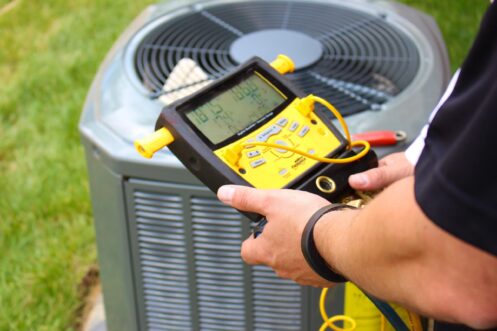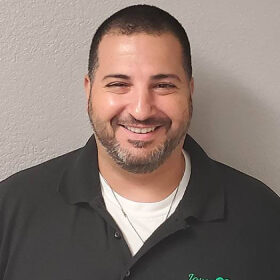Even perfectly installed and well-maintained air conditioners don’t last forever without needing some repairs. The good news is, there before they break down, they send signals warning you that something’s wrong. All you have to do is to stay vigilant to notice these signs and then call an expert. Addressing problems early is very important not only for your safety but also for extending the lifespan of your AC. Here are five signs you should watch out for.
1. Weak Air Flow
If cool air from your indoor units or supply vents takes a sudden downtick in volume or force, it’s a clear indicator that something is impeding your AC’s ability to circulate air effectively. The obvious culprit is dirty filters. Filters accumulate dust and debris over time, which can block air from flowing through the system. If sufficient air isn’t flowing in, there won’t be enough cool air blowing out.
Obstructed return vents can also contribute to this issue. These vents transport warm indoor air to the evaporator coils for cooling. If blocked by furniture, pests, or any other household item, airflow will weaken.
Another major cause of weak airflow is blower motor issues. The blower motor propels the AC fans to pull in warm indoor air and blow out cooled air to various rooms in your home. If it experiences wear and tear, electrical failures, physical damage, or excessive dirt buildup, it may struggle to function properly, which could lead to poor airflow and reduced cooling capacity.
Additionally, ductwork problems, such as leaks, disconnected sections, or excessive buildup of dust and debris, can limit airflow efficiency. Leaks and gaps in the disconnected sections misdirect the air flowing through the system, reducing the volume of air that actually reaches each room. Excessive dust buildup, on the other hand, blocks the free flow of conditioned air to where it is needed.
Unless the source of weak airflow is filter-related, contact an expert AC repair technician immediately. The longer you let your system run, the more damage can occur to its critical components. For instance, leaky ducts can cause your AC to overheat, potentially creating a fire hazard.
2. Water Leaks
A leaking AC is dangerous because it can cause water damage, pose electrical risks, and overwork your unit, potentially causing system failure. Be sure to turn off your AC and call for professional help.
Air conditioner water leakage stems from a clogged condensate drain or damaged condensate pan. Naturally, AC units produce water during operation. The evaporator coils that cool warm indoor air also cause moisture present in the air to condense and form water droplets.
This water is then collected in the condensate pan and drained away via the condensate line. If the pan is rusted or damaged, it will leak water inside the unit. Similarly, if the condensate line is blocked (by dust, debris, or algae), water will back up and overflow, leading to leaks around the system.
If your AC is relatively new and leaks a lot of water, you could have an installation issue. Incorrectly installed drainage pan or improper sizing may result in poor water management. Moreover, low refrigerant levels can lead to frozen evaporator coils, which eventually thaw and produce excessive water that overwhelms the drain system.
3. Unresponsive or Faulty Thermostat
The thermostat is your unit’s brain. It tells it when to kick on, cycle off, and maintain the desired airflow in your home. When working properly, it not only ensures maximum comfort but also helps extend the lifespan of your AC. However, when malfunctioning, it can lead to inconsistent temperatures, poor indoor quality, short cycling, or even a complete system failure.
There are four top causes of an unresponsive thermostat. The first is dirty sensors. Dust, dirt, and lint can accumulate inside the thermostat’s housing and block the sensors, preventing accurate temperature readings. This interference can cause the AC to cycle improperly or not respond to temperature adjustments.
The second issue is faulty wiring. Loose or corroded connections can disrupt communication between the thermostat and the AC. The AC might not respond to your settings or start and stop intermittently.
Third, incorrect settings or calibration errors may be to blame. In some cases, someone can accidentally set the thermostat to the wrong mode, such as ‘heat’ instead of ‘cool.’ Power fluctuations or wear and tear on the sensors can affect the thermostat’s accuracy. You will need to call a professional to recalibrate it and restore proper functionality.
Lastly, poor thermostat location can cause issues. For instance, if it’s paced near a heat source, it’ll read the temperature of that specific area rather than the overall average temperature of the room. Your AC will cool excessively, trying to reach a set point based on an inaccurately high reading.
4. Unusual Noises
When something is wrong, your air conditioning system will most likely produce a strange sound. Be sure to turn off your system and call a professional to investigate the reason behind the unusual noise.
The common sounds you’ll hear include hissing, rattling, high-pitched squealing, clicking, and banging noises. Hissing noises (often accompanied by bubbling sounds) typically indicate a refrigerant leak. Refrigerant is a highly toxic compound. Avoid direct exposure and ensure no one goes near the leaking point.
Rattling and banging noises may suggest loose or broken components within the AC unit. These sounds often stem from unsecured bolts, damaged fan blades, a failing compressor, debris caught within the system, and worn-out motor mounts.
High-pitched squealing means there is excessive internal pressure in the compressor. Meanwhile, clicking sounds may suggest a defective contactor or relay from electrical control. You’ll also notice your AC shutting off unexpectedly or struggling to turn on.
5. Weird Smells
An air conditioner is a comfort system, meaning it should improve the quality of air inside your home. If you get rotten egg, musty, or chemical-like smells, there’s a problem. Musty smells are commonly associated with mold growth. But they could also stem from bacterial or fungal growth in the filters or ductwork. A rotten smell in ACs usually suggests a dead pest in the ducts, while a chemical-like smell comes from a refrigerant leak.
When Replacement Is the Sounder Option
Consider AC replacement instead of repairs when your system is older than 10 years. At this age, the level of wear and tear is too significant to fix. Your system will frequently break down, and you’ll also notice declining efficiency.
Additionally, if your unit requires repairs every cooling season or if repair costs amount to 50% or more of the price of a new system, replacement is often the more cost-effective choice. Some components, like compressors, are not worth replacing individually. A new compressor may put excessive strain on older components due to its increased efficiency, leading to further wear and potential system failure.
Contact Loves Air for More Information
Call Loves Air for expert AC repairs in Modesto. With over 15 years in the HVAC industry, we bring a wealth of knowledge and unmatched service quality to every repair project we undertake. You can also trust us for all your AC replacement and maintenance needs.



